Saturday, 30 June 2007
Distance 14 km
Duration 3 hours 50 minutes
Ascent 343 m, descent 337 m
Map 58 of the TOP100 blue series (now superseded)
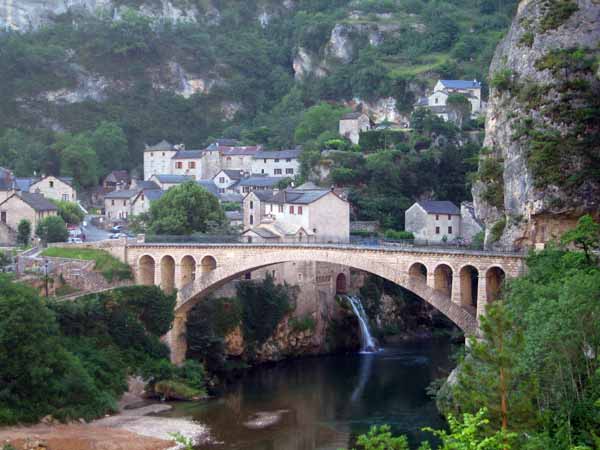
Just in case Saint-Chély-du-Tarn had a bar or a café that we could visit, we delayed our normal hour of departure, to give this hoped-for institution time to open.
We left at 7:30 and, as it was only about three kilometres down the road, we got there just after 8 am without any annoyance from traffic. Our only problem was the biting cold.
There was a side road that left the main one and threaded through a hole in the rock, before crossing a high, elegant bridge to the village. Nearby, a natural spring hurled itself into the river, enclosed by a chapel.
We passed the ancient church and arrived in the square, where there was no sign of a shop of any sort, so we were momentarily cast down until we noticed a Logis de France hotel at one side. It had a glassed-in bar at the front, and we could see guests having breakfast inside.
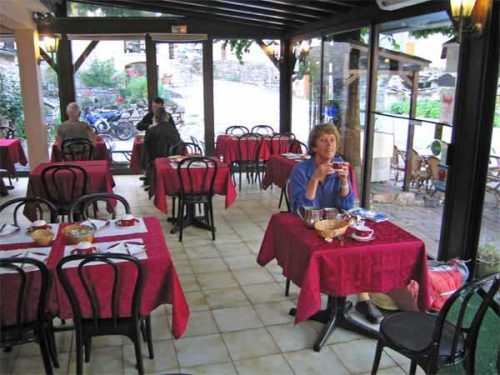
The African waiter welcomed us cordially, despite our dishevelled appearance, and brought us large jugs of both coffee and hot milk, together with a basket of fresh rolls and jam. The room was warm and we lingered over our luxurious second breakfast.
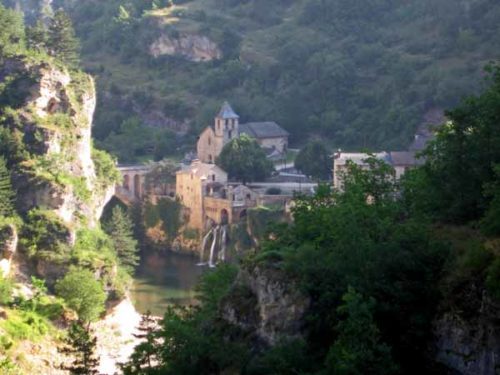
Eventually we dragged ourselves away to connect with the track at the top of the village.
It was the same age-old stone walking road that we had been on yesterday, its masonry still in good order a century after it was superseded by the road.
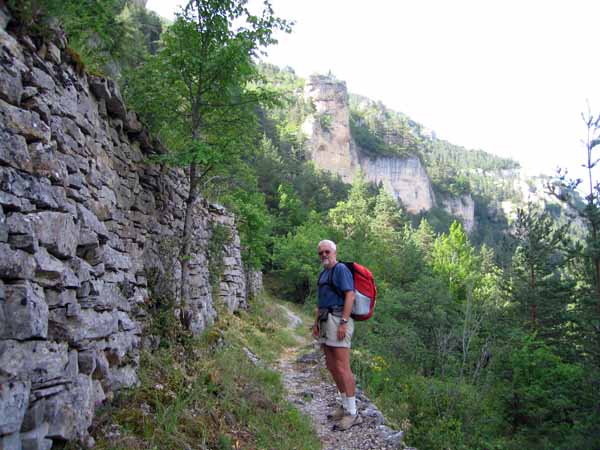
After weaving up and down amongst the beetling rocks for a long distance, it descended at last out of the forest at Hauterives, which, even more than Castelbouc yesterday, had the air of a past age.
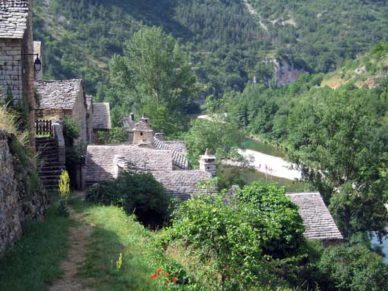
It was a cluster of slate-roofed cottages by the river, linked by grassy paths, with no car access for several kilometres. Its only concession to modernity was a flying fox across the river to the highway. The houses were surprisingly well-looked-after, probably holiday homes, and there were canoeists pulled up on the sandbank.
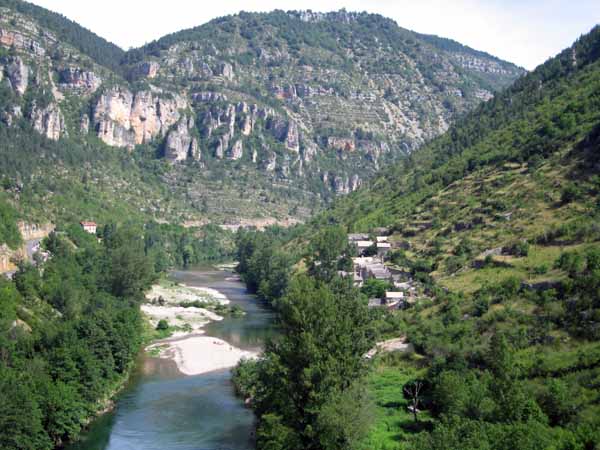
Above the hamlet, the terraced hillside has largely been surrendered to nature, although remnants of fruit trees and vines survive. Higher up again are the sad vestiges of the château, barely distinguishable from the crags on which it stands.
It was 11 o’clock and we felt the need for a break, so we sat by the track and ate the cheese and bread from last night’s dinner.
While we were there, a dumpy woman carrying a walking stick but no pack came past. She said she was on holiday at la Malène and had taken a morning stroll to Hauterives. She was the first fellow walker we had seen in the Gorges.
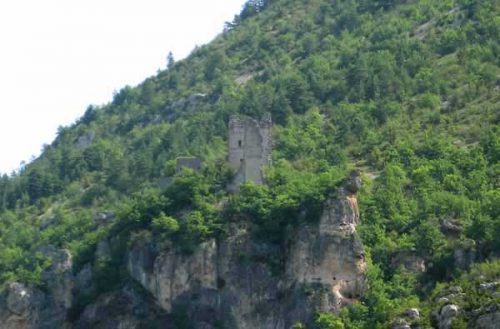
The path continued as before, sometimes level, sometimes climbing or falling, but always easy to walk on, and quite soon we arrived at a tar road, crossed the bridge and found ourselves in la Malène at noon.
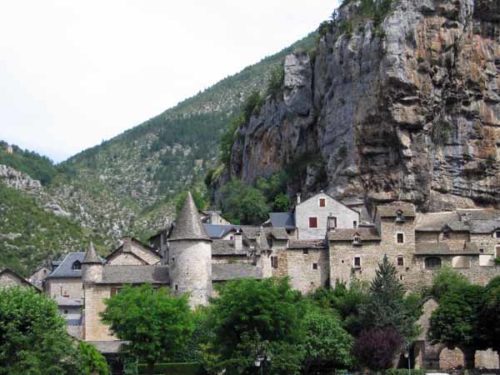
The village was backed up against a towering rock, whose lower surface still bore black scorch marks from the burning of the town during the Revolution. The château, with its gleaming conical roofs, was now a hotel.
Because of the valley behind la Malène and the relatively low escarpment opposite, the village was a traditional crossing point for flocks being taken to and from the high pastures – the transhumance.
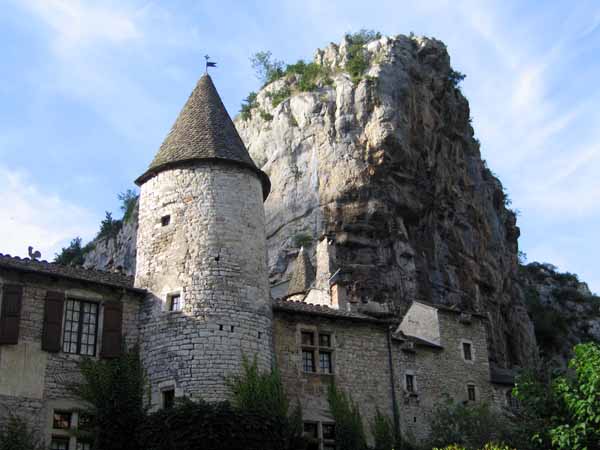
We sat under chestnut trees at a café overlooking the river to celebrate our arrival with coffee. It had been a short day, by our standards almost a day off.
In contrast with Sainte-Énimie, the camping ground was right next to the village. We had our lunch there, sitting up in plastic chairs that were provided for the use of walkers.
Later in the afternoon while we were resting, two other pairs of walkers arrived, one French and the other German, both couples carrying monumental packs full of cooking equipment, which they proceeded to use to make their dinners.
We, on the other hand, wandered off, perhaps a little smugly, to survey the restaurant scene.
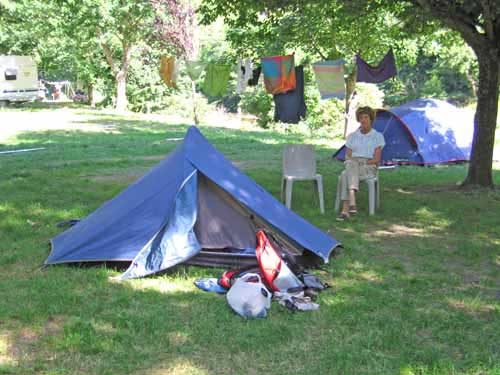
There was not much of a choice. The château-hotel was absurdly expensive and under-patronised, while the restaurant behind it was closed. The only other one was between the camping ground and the bridge, reached via a tunnel under the bar terrace where we had just had our preliminary rosé, and it turned out to be delightful.
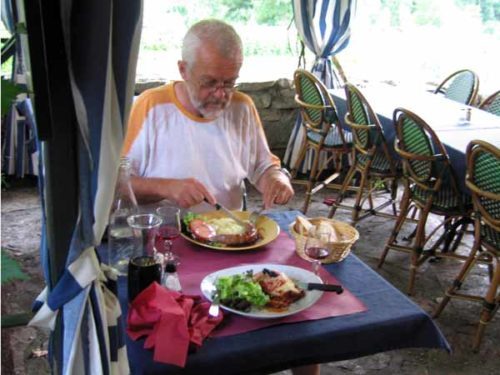
It was quite full when we arrived but we got a good table at a window, opening onto a long vegetable garden which sloped down to the river and the darkening mass of the gorge beyond.
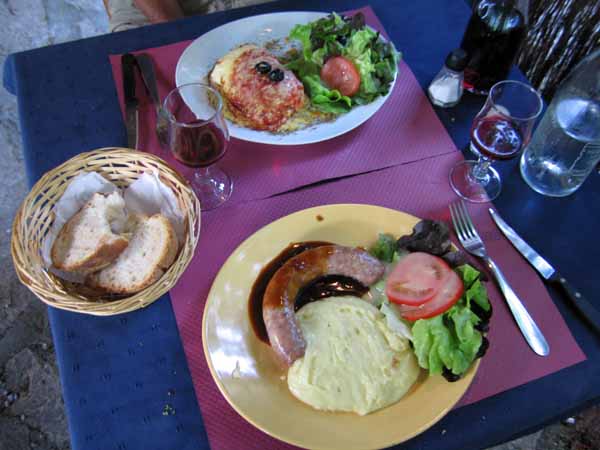
We started with a shared salad, then I had lasagne and Keith had aligot with sausage – mountain food, since we were in the mountains.
The aligot was pleasant, but lacked the true rubbery magnificence of the one we had eaten not far away, in the Aubrac, in 2002.
As usual, we made short work of the bread and wine. To complete our easy day, we only had a few steps to walk to our tent.
Previous day: Florac to Ste-Énimie